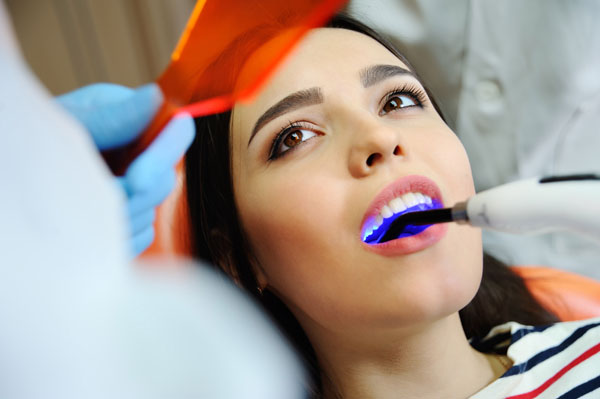 There may be dental restorations available to treat a tooth that is damaged. The prognosis for restoring a damaged tooth is best when treatment takes place as soon as possible after the tooth breaks or cracks. This can occur from biting down on something that is too hard but can also happen if you get hit in the mouth. The longer you wait after breaking a tooth, the less likely it is that a dentist can restore it.
There may be dental restorations available to treat a tooth that is damaged. The prognosis for restoring a damaged tooth is best when treatment takes place as soon as possible after the tooth breaks or cracks. This can occur from biting down on something that is too hard but can also happen if you get hit in the mouth. The longer you wait after breaking a tooth, the less likely it is that a dentist can restore it.
Does a broken tooth hurt?
Whether a broken tooth hurts depends on how deep the damage goes. The nerves in a tooth are in the dentin and the pulp, which are protected by the layers of hard enamel on the outside. If the crack or fracture exposes the pulp and the dentin, it can cause pain.
However, the tooth enamel has no nerves, nor any blood vessels. It would not be able to perform the work of chewing if it did because the act of biting down would cause pain. If a fracture or crack extends no deeper than the enamel, you typically experience very little, if any, pain from it. However, this does not mean that a broken tooth that does not hurt can be ignored.
What can happen if a broken tooth goes untreated?
Without appropriate dental restorations in a timely manner, a broken tooth can lead to other dental health problems.
Bacterial infection
Even a crack in the tooth's surface may be enough to allow bacteria to reach the dentin and the pulp of the tooth. The bacteria may proliferate and cause an infection. This can spread to the gums and, if it gets into the bloodstream, even affect other areas of the body far away from the mouth.
Sensitivity
Exposure of the nerves inside the tooth's pulp, as well as bacterial infection, could cause the teeth to become sensitive. You may feel a twinge of pain with temperature changes inside your mouth or pressure on the damaged tooth.
Soft tissue lacerations
A broken tooth can leave behind a sharp edge. Soft tissues in your mouth, such as the cheeks or the tongue, may rub up against the edge. These tissues are very delicate and can get cut from contact with the hard, sharp edge of a broken tooth.
Further damage
A tooth that is cracked or broken becomes weak and unstable. Subjecting it to the normal pressures of eating and chewing may be more than it can take, and it could break further. Eventually, the tooth may be so severely damaged that it can no longer be fixed by dental restorations.
Damage to other teeth
Teeth are intended to stand up to a lifetime of chewing, so the enamel is very hard. If a piece of a tooth breaks off in your mouth while you are eating, you may not feel it or notice it if it only involves the enamel. While the broken piece is floating around in your mouth, you may accidentally bite down on it, potentially damaging another tooth.
Conclusion
It may be possible to use dental restorations to fix a broken tooth. However, the chances decrease with delays in the treatment.
Request an appointment or call Alexandria Old Town Dental at 703-763-1078 for an appointment in our Alexandria office.
Related Posts
Dental restorations are used to repair or strengthen damaged teeth and to replace missing teeth. The damage may be the result of routine decay, extensive decay, fractures, weak gums, and many other dental issues. Dentists recommend restorations based on the tooth, its location, the source of trouble, the health of surrounding teeth, tooth color, patient…
For patients who have damaged or decaying teeth, dental restorations may be a necessity. Dentists use a variety of restorative procedures to protect and repair the structural integrity of an individual's teeth. Some of the most common restoration procedures may include dentures, crowns, and fillings.No individual should suffer from severe tooth pain or discomfort. Decaying…
Dental restorations have been used for thousands of years. In fact, a 2012 article published by The New York Times details the discovery of a 6,500-year-old human jawbone. Considered the earliest evidence of dental fillings, it had beeswax in one tooth, which researchers believe was to ease the pain of a crack. These days, restorations…
